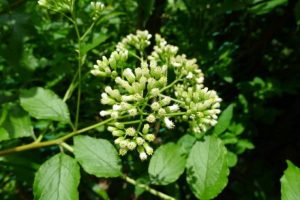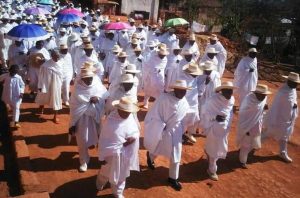Three African women speak of their social commitment
Kenyan Catherine Ngila is one of the most prestigious scientists on the African continent. In 2016 she was named South Africa’s best scientist and in 2021 she received the L’Oréal / UNESCO Prize for Women in Science.
She was born in Kitui, 61 years ago, the first of the family of 27 brothers and sisters to attend high school and university, although she was the daughter of her father’s fourth wife. She was orphaned at the age of six, “I realized very early on that I had to study to be able to take care of myself because I wouldn’t have my mother to take care of me”.
During her childhood and adolescence, Catherine combined long journeys to and from school with the daily transport of water from the river to the family home. What she took from the river was a cloudy, reddish liquid which she had to filter through a piece of cloth and dilute with calcium bicarbonate to try to remove the impurities. This rudimentary water treatment didn’t ease Ngila’s doubts, “and I couldn’t help but wonder if it was enough to make the water clean”.
Professionally, Ngila graduated from Kenyatta University in Nairobi, received her PhD in analytical chemistry from the University of New South Wales (Australia) and worked as a lecturer in Botswana and several South African universities, where she became one of the first black faculty members. Today Ngila is the director of the Department of Chemical Sciences at the University of Johannesburg and is the acting executive director of the African Academy of Sciences and a member of the South African Academy of Sciences.
The team she leads at the University of Johannesburg is working on using nanotechnology to detect and remove toxic substances and trace metals from water. “My dream – she says – is to produce a commercially viable water nanofilter accessible to rural African households”.
The other major challenge is access to higher education for girls. When she majored in chemistry, she was aware of the tendency to think that girls couldn’t pursue science. This reality prompted her to ask governments, and UNESCO itself, to promote campaigns to encourage girls to choose scientific studies.
(Javier Fariñas Martín)
Eliana Silva, telling stories
In October 2020, Eliana Silva took her cue from the ‘Voices of African Women’ dossier, published by the New African magazine, to talk about the ‘inspirational story of Bina’. At the end of the collaboration, and as a digital corollary, Silva left four tags that serve to define her as a communicator: #storytelling, #narratives, #representation, and #belonging.
Silva’s cultural heritage – the daughter of a Portuguese father and Angolan mother – led her to learn and feed on the values and riches of the metropolis and the former colony. And from this knowledge, with the help of the net, in 2014 her desire to live and work in Maputo, the capital of Mozambique, developed. Maputo was another colonial mirror in which to look at oneself. But, due to your breadth of vision, you also understand the other great point of reference for the Lusophone world: Brazil. Because of her predilection for that country, she has declared: “I have a Bahian body, a Paulist brain and a Carioca soul”.
If we take for granted the definition of storytelling as the art or ability of a person to tell stories, we understand that this concept fits Eliana Silva’s personal and professional life. This is demonstrated, for example, by her latest editorial project, Marcas por Escribir, presented in February last year, through which she wanted to position companies from the Lusophone world on the market. The initiative aimed to become a space where the stories of Mozambique, Angola, and Cape Verde converge, but which also had a reflection in São Tomé and Príncipe and Guinea-Bissau. Silva has also worked in the world of institutional communication, marketing and advertising, a path that led her to the Create advertising agency, or to Índico, the official magazine of Mozambican Airlines.
However, it is in literature that Silva’s main references are found. In the midst of the pandemic, the author has decided to present “Bina, the discoverer of the Indian Ocean”, her first foray into the world of fiction for children and teenagers. Through this work, you approach the world of albinism, with a significant impact on societies such as that of Mozambique – it is estimated that 30,000 people in the country suffer from this genetic alteration – and also that of Angola. Bina is the result of almost ten years of work, observation and conversations with friends and acquaintances. About the book, Eliana Silva said that “it’s a book with a lot of empathy, a lot of travel, a lot of courage and a lot of colour. I wanted to share the message that all girls and boys can go anywhere” as the protagonist of this story.
In the book, it is said that Bina was born on the island of Mozambique, the island of coral origin where the Portuguese established the first capital of the colony, and with a bicycle, she crosses Brazil, France, Japan and Angola. And in this South West African country, she meets Milu. An Albino like herself, Milu helps the protagonist of this story to discover and value the uniqueness of each person, regardless of skin colour, identity, or characteristics. “Cycling will be the most fun” of this story created by Eliana Silva, who Eugenio Scalfari, a historical Italian journalist and co-founder of La Repubblica, would say are “people who tell what happens to people”. (Javier Fariñas Martín)
Helena Ndume. Ophthalmologist by vocation
A person’s true calling sometimes has little to do with the first impulses of the heart. This is the case of Helena Ndume who, as a teenager, dreamed of becoming a fashion designer; instead, she finishes studying medicine.
Helena received her medical doctorate from the University of Leipzig in 1989. She later specialized in ophthalmology, realizing that this specialization was the most necessary to address blindness, a major problem in her home country of Namibia, where there were just six ophthalmologists working in the public health system. Since then, Dr Ndume has dedicated her life and her career to the treatment of blindness and visual impairment, not only in Namibia but also in neighbouring countries in southern Africa. Since 2005 she has been the head of the ophthalmology department of the public hospital in Windhoek, the capital of her country.
Years previously, supported by her husband, Dr Solomon Guramatunhu, also an ophthalmologist, she joined the Surgical Eye Expedition-SEE, an international charity with 600 ophthalmologists. With them, at least twice a year, she organizes week-long clinics in which she provides free eye surgeries to several hundred people in need.
For Dr. Ndume, “there is no money in the world that can repay the joy of those who, after being blind for many years, suddenly regain their sight. It’s not nice to stay in private practice, earning money, while there are thousands of blind people around you”, she says.
Dr. Elena Ndume has received important awards. Among them, the Nelson Mandela Prize in 2015, awarded by the United Nations in recognition of her dedication to the service of humanity. In 2022 she obtained two important awards: the Lions Club International Humanitarian Award and the Forbes Woman Africa Social Impact Award.
(Celin Avel)






